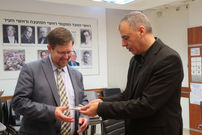
Qaqilya/Kfar Saba
Our Vision: To create broad-based partnerships among institutions, businesses and citizens of Gainesville, Kfar Saba, and Qalqilya, sharing in the areas of education, culture, local government, business, and sports with exchanges such as:
-
Working cooperatively on mutual interests, solving municipal problems and sharing resources, ideas, and expertise in such areas as zoological science, summer camps, use of green space, resource management and conflict resolution
-
Visiting private homes, sharing meals, stories, and histories together
-
Communicating via phone, mail, e-mail, and fax.
-
Exchanging students, athletes, actors, artists and summer campers
-
Organizing live and video conferences, seminars, and workshops for sharing different perspectives on common topics of interest
-
Providing services to individuals with specific needs which can be better met in one of the other cities
-
Setting up internships and apprenticeships in specialized areas such as beekeeping, theatre, medical specialties, culinary arts, business, and journalism.
Mission Statement:
-
To encourage the people of the cities of Gainesville, Kfar Saba and Qalqilya to acquire a consciousness and an understanding of one another as individuals, as members of their communities, as citizens of their countries and as part of the family of nations;
-
To foster as a consequence of such consciousness and understanding a continuing relationship of mutual concern among the people of the cities of Gainesville, Kfar Saba and Qalqilya;
-
To undertake activities and programs as well as provide to one another appropriate aid and comfort, education and mutual understanding;
-
To promote and publicize cooperation among the three cities, thereby encouraging other organizations and residents of the cities to participate in the program;
-
To foster and promote friendly relations and mutual understanding among peoples of the three cities; and
-
To act as a coordinating body for organizations, groups and individuals desiring to engage in activities with similar organizations, groups, and individuals in the cities.
Qalqilyah is a Palestinian city in the West Bank. Most of the residents are farmers, and constant contact with Israeli farmers has made Qalqīlyah a bilingual town. The town is located in the West Bank’s closest point to the Mediterranean Sea, some 12 km away. As of 1996, its number of inhabitants was estimated at 28,300.
The town’s area has been populated from prehistoric times, and prehistoric flint tools were found in the modern town’s area. In Roman times, a way-station existed in the location called Kalkaliya. Invading armies, many of which came from the Mediterranean coast just 12 km away, often came through Qalqilyah. Its Canaanite origins are murky, but its current name comes from the Roman Qala’alia, meaning high fortress. During the subsequent Muslem rules of the area, the town was populated with Arab inhabitants.
Kfar Saba (literally: “Grandfather’s Village”; officially also spelled Kefar Sava) is a city in the Sharon area, Center District of Israel in Israel. According to the Israel Central Bureau of Statistics (CBS), at the end of 2005 the city had a total population of 80,700. The land where the city of Kfar Saba now is was bought in 1892 by a group of Jewish Zionist settlers, who then offered the lands for sale. The acquisition turned out to be unsuccessful because the lands were located at a desolate, neglected area and were far from any other Jewish settlement. After the failure they were finally bought 1896 by Baron Edmond James de Rothschild. In 1903, the Baron sold the land to the farmers of Petah Tikva to be populated by the 2nd generation – the immediate descendants of the farmers. However, they, in turn, sold the land to others, mostly new immigrants. The Ottoman government refused to give building permits, therefore the first settlers were forced to live in huts made of clay and straw. They earned their living by growing almonds, grapes, and olives. Only in 1912 the settlers moved to permanent housing.
In World War I, Kfar Saba was on the front line between the British army and the Ottoman army and was destroyed. At the same time about a thousand residents of Tel Aviv and Jaffa came to live in the town. They had been forcibly deported from their homes by the Ottomans. Due to the pogroms of 1921 these deportees returned to their original cities. In 1922 the original residents returned and in 1924 additional settlers joined them. In this period the cultivation of citrus fruit developed. In 1937 Kfar Saba was declared a local council.
In the time of the Arab Revolt, in 1936-1939, as in the 1948 Arab-Israeli War, Kfar Saba’s population suffered from attacks by Arabs from the Arab, Saba village and other villages in the area. A short time before the Israeli declaration of independence these villages were taken in Operation Medina. In 1962 Kfar Saba was awarded city status. At the time of the Six-Day War Kfar Saba suffered attacks from the neighboring town of Qalqilyah that is located just over the 1949 armistice line with Jordan.











